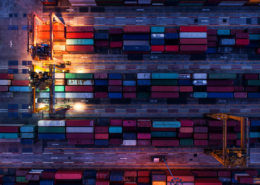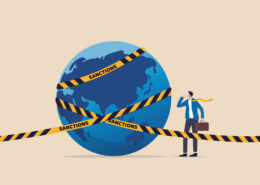Binging Griselda? Let’s Talk Drug Trafficking Sanctions
How the United States Uses Sanctions to Counter Narcotics Trafficking
📅 March 7, 2024
📅 March 7, 2024
Netflix’s new series Griselda tells the story of Griselda Blanco. Known as the “Godmother of Cocaine,” Blanco trafficked cocaine from Colombia to Miami from the 1970s to the early 2000s. Despite her criminal activities, Blanco managed to evade law enforcement for many years. She was eventually arrested in 1985 in connection with drug trafficking and sentenced to 15 years in prison. There were no sanctions against Blanco at the time, since the Kingpin Act, a U.S. law aimed at combating international drug trafficking and organized crime, was enacted in 1999 after Blanco’s sentencing.
In the realm of global criminal activity, drug trafficking emerges as a pervasive and intricate issue that transcends international borders, casting its disruptive shadow upon societies and economies worldwide.
In response to the multifaceted challenges posed by this illicit trade, nations have strategically employed sanctions as a pivotal tool in their efforts to combat those who profit from the widespread suffering narcotics trafficking inflicts. Understanding the complexities surrounding drug trafficking sanctions, their efficacy, and the evolving landscape of international cooperation is key to sanctions compliance.
Counternarcotics sanctions are some of the earliest forms of list-based sanctions imposed by the United States. The U.S. government has the authority to freeze assets, prohibit transactions, and impose financial sanctions on those designated as significant narcotics traffickers.
The illicit drug trade remains a global issue causing thousands of deaths annually. The Biden administration in 2023 announced plans to further strengthen its approach toward disrupting fentanyl and other drug supply chains in collaboration with other global authorities. The approach includes a coordinated global effort to disrupt the synthetic drug trade, strengthening coordination and information-sharing among U.S. intelligence and law enforcement agencies, increasing engagement with the private sector globally to fight illicit drugs, and protect the U.S. financial system from abuse by drug trafficking organizations.
As of February 2024, there are over 200 individuals and entities designated as Specially Designated Narcotics Traffickers (SDNTs) and over 1,400 Specially Designated Narcotics Trafficker Kingpins (SDNTKs). Both terms are used to designate individuals and entities involved in significant narcotics trafficking, but “SDNT” is a broader designation, while “SDNTK” specifically refers to high-profile individuals and organizations involved in narcotics trafficking, often associated with major drug cartels.
OFAC and its U.S. partner agencies employ diverse methods to enforce sanctions under the Kingpin Act. However, assessing the Act’s overall effectiveness is challenging, because isolating its impact from other counternarcotics initiatives is challenging. Reported outcomes indicate the designation of over 2,000 individuals as Kingpins and their supporters, along with the freezing of assets exceeding half a billion dollars between 2000 and 2019.
Through disrupting their operations and imposing financial repercussions, counternarcotics sanctions have effectively discouraged the influx of drugs, notably opioids and fentanyl, into the country. Moreover, the rigorous enforcement of these measures has played a role in dismantling trafficking networks and diminishing the prevalence of narcotics and controlled substances within U.S. borders. This has, in turn, contributed to safeguarding public health and bolstering national security. However, more work must be done to continue fighting narcotics trafficking to the United States. The United States and China in November restarted bilateral cooperation on counternarcotics, focusing on reducing the flow of precursor chemicals for illicit fentanyl and other synthetic drug production. Increased engagement with other countries that are high-risk for illicit drugs and enhanced information-sharing among U.S. stakeholders will help in the battle. Since Griselda Blanco’s prosecution, U.S. sanctions have provided additional tools not just to criminally prosecute drug traffickers, but also cut off their access to the global financial system and protect the U.S. financial system.
Visit the DOLFIN library for more information on counternarcotics sanctions and illicit drug activity.










 Are Casinos Havens for Money Laundering?
Are Casinos Havens for Money Laundering?This site uses cookies. By continuing to browse the site, you are agreeing to our use of cookies.
Accept settingsHide notification onlySettingsWe may request cookies to be set on your device. We use cookies to let us know when you visit our websites, how you interact with us, to enrich your user experience, and to customize your relationship with our website.
Click on the different category headings to find out more. You can also change some of your preferences. Note that blocking some types of cookies may impact your experience on our websites and the services we are able to offer.
These cookies are strictly necessary to provide you with services available through our website and to use some of its features.
Because these cookies are strictly necessary to deliver the website, refusing them will have impact how our site functions. You always can block or delete cookies by changing your browser settings and force blocking all cookies on this website. But this will always prompt you to accept/refuse cookies when revisiting our site.
We fully respect if you want to refuse cookies but to avoid asking you again and again kindly allow us to store a cookie for that. You are free to opt out any time or opt in for other cookies to get a better experience. If you refuse cookies we will remove all set cookies in our domain.
We provide you with a list of stored cookies on your computer in our domain so you can check what we stored. Due to security reasons we are not able to show or modify cookies from other domains. You can check these in your browser security settings.
These cookies collect information that is used either in aggregate form to help us understand how our website is being used or how effective our marketing campaigns are, or to help us customize our website and application for you in order to enhance your experience.
If you do not want that we track your visit to our site you can disable tracking in your browser here:
We also use different external services like Google Webfonts, Google Maps, and external Video providers. Since these providers may collect personal data like your IP address we allow you to block them here. Please be aware that this might heavily reduce the functionality and appearance of our site. Changes will take effect once you reload the page.
Google Webfont Settings:
Google Map Settings:
Google reCaptcha Settings:
Vimeo and Youtube video embeds:
You can read about our cookies and privacy settings in detail on our Privacy Policy Page.
Privacy Policy